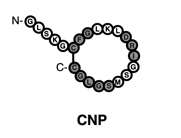
The Eagle Biosciences NT-proCNP ELISA Assay Kit (manufactured by Biomedica) was used in a recent study published out of the University of Otago in Christchurch, New Zealand. This kit is used for the quantitative determination of NT-proCNP in human serum and plasma (EDTA, citrate, heparin). CNP, C-type natriuretic peptide, along with other natriuretic peptides, plays a role in regulatory mechanisms including blood pressure and body fluid homeostasis. It also serves as a biomarker.
Plasma C-Type Natriuretic Peptide: Emerging Applications in Disorders of Skeletal Growth
Abstract
Although studies in experimental animals show that blood levels of C-type natriuretic peptide (CNP) and its bioinactive aminoterminal propeptide (NTproCNP) are potential biomarkers of long bone growth, a lack of suitable assays and appropriate reference ranges has limited the application of CNP measurements in clinical practice. Plasma concentrations of the processed product of proCNP, NTproCNP – and to a lesser extent CNP itself – correlate with concurrent height velocity throughout all phases of normal skeletal growth, as well as during interventions known to affect skeletal growth in children. Since a change in levels precedes a measurable change in height velocity during interventions, measuring NTproCNP may have predictive value in clinical practice. Findings from a variety of genetic disorders affecting CNP signaling suggest that plasma concentrations of both peptides may be helpful in diagnosis, provided factors such as concurrent height velocity, feedback regulation of CNP, and differential changes in peptide clearance are considered when interpreting values. An improved understanding of factors affecting plasma levels, and the availability of commercial kits enabling accurate measurement using small volumes of plasma, can be expected to facilitate potential applications in growth disorders including genetic causes affecting the CNP signaling pathway.
Espiner, E.; Prickett, T.; Olney, Robert; (2019). Plasma C-Type Natriuretic Peptide: Emerging Applications in Disorders of Skeletal Growth. Horm. Res. Paediatr., 90:345–357. DOI: 10.1159/000496544
Contact us for more information about this kit or our other natriuretic peptide assay kits.








